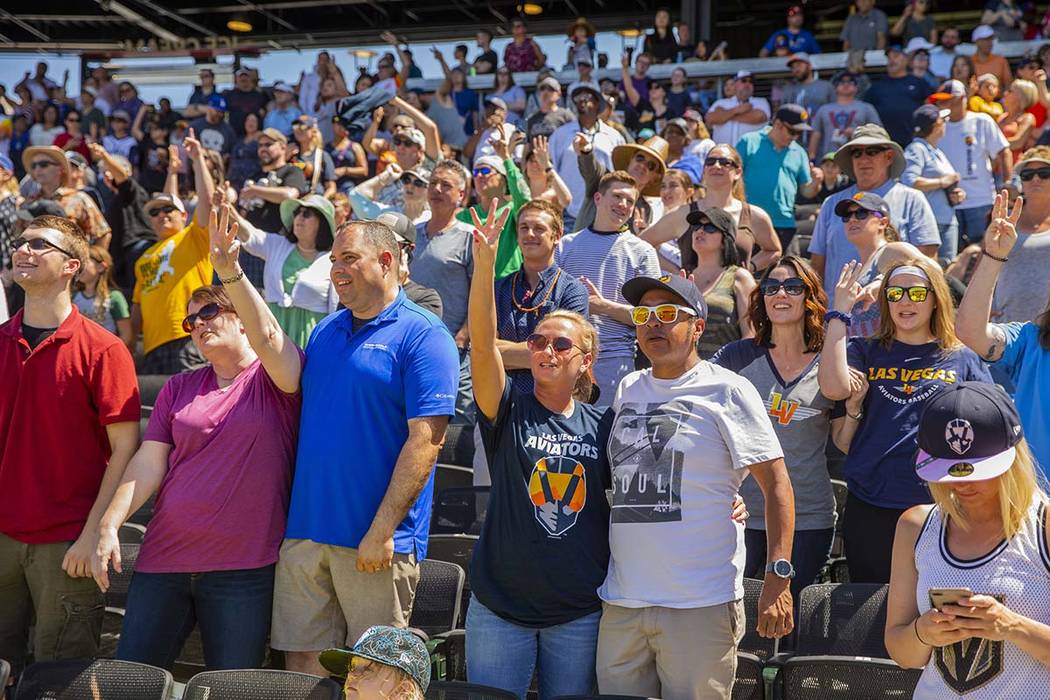Aviators to consider extending safety nets after recent incidents

It is generally agreed that everything about Las Vegas Ballpark is just about perfect, which explains why it was voted the best Triple-A ballpark by minor league baseball fans last week.
But like bolstering one’s bullpen, there’s always room for improvement when it comes to fan safety.
It was decided during a Pacific Coast League executive committee conference call last week that league members should consider extending safety netting to protect fans from foul balls. The current standard is dugout to dugout, but high-profile incidents in recent major league games have illustrated a need to expand protection.
“To me, the end of the dugout works,” Aviators president Don Logan said about the trade-off between spectator safety and sight lines. “But we’ve had a couple of incidents of people getting hit beyond the net.”
During a recent homestand, Las Vegas slugger Seth Brown turned on a ball and sent it rocketing into the stands in the right field corner.
“When (the ball) hit, it bounced all the way back onto the field,” Logan said. “That’s the one that is dangerous.”
But even an innocuous-appearing ground ball can spoil an enjoyable evening at the ballpark. During the same stretch of games, Logan said a foul grounder with topspin kicked into the crowd where it struck a fan sitting beyond the net, causing a bloody nose.
Safety over sight lines
“It will change the engineering and some of the dynamics of the ballpark, but we’re going to look at it,” Logan said about extending the foul ball nets. “Making sure people are safe is the most important part of it.”
Protecting the ballclub from liability in a litigious society is another part if it.
This is not the first time foul balls causing bodily harm at games has become an issue. After first-year commissioner Rob Manfred recommended that netting be extended to the edge of the dugouts, about a third of major league clubs did so during the 2015-16 off-season. By 2018 Opening Day, all 30 were in compliance.
But late last season, a woman who was struck in the head with a foul ball at Dodger Stadium later died. In May, the Cubs’ Albert Almora hit a liner into the seats in Houston that fractured the skull of a 2-year-old girl.
“Baseball is 150 years old; what’s going on?” Logan said about the rash of spectator injuries caused by foul balls.
Two theories: With the advent of social media, the graphic nature of injuries caused by foul balls is more compelling.
And also with the advent of social media, more people are watching their cellphones instead of the game when balls are batted into the stands at more than 100 mph.
“I mean, I do it,” Logan said of being distracted at the ballpark and elsewhere. “I was at the 30th anniversary party for two of my dearest friends and my wife said, ‘Are you going to listen to what they have to say, or are you going to look at your phone?’
“I was looking at the MLB scores.”
Falling score
Logan said if spectators are checking scores, they aren’t focused on the game and it becomes harder to protect themselves.
And even when they are paying rapt attention, they still can be injured by a batted ball possessing lots of launch angle and exit velocity.
One can assume that Indians’ pitcher Herb Score was focused on the game when he was struck in the face by Gil McDougald’s line drive in 1957 that many blame for ending his career.
Today’s players are bigger and stronger than in Herb Score and Gil McDougald’s day. Physics would suggest that baseballs thrown and struck at greater speeds leave less time to react than when seats in the bleachers cost 50 cents.
Conversely, the most expensive seats at any ballpark have always been the ones behind home plate. You’ll probably have to know a CEO or a pseudo-celebrity such as Mary Hart to sit there, but what’s the other thing those seats have in common?
That’s right. They are shielded by a protective screen.
I was watching a recent Dodgers game when a foul ball came rocketing back to the screen. A couple of fans apparently not used to sitting so close to the field ducked and covered.
Mary Hart never flinched.
Contact Ron Kantowski at rkantowski@reviewjournal.com or 702-383-0352. Follow @ronkantowski on Twitter.